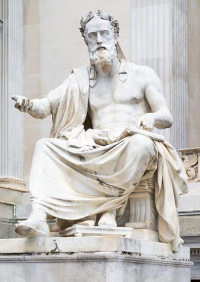Xenophon: Writer, Soldier, Philosopher of Ancient Greece
One of the most multi-talented individuals in the Ancient Greek world was Xenophon. He is perhaps most well remembered for his historical writings, but he was also a soldier and a philosopher. He was born in 430 B.C., in the shadow of the infancy of the Peloponnesian War, in a suburb of Athens called Erchia. His family owned a large farm estate. Not much else is known of his early life. 
When he was 29, Xenophon joined the mercenary army of Cyrus the Younger, who was at that time rebelling against his brother, who happened to be King Artaxerxes II of Persia. The Persians put down the rebellion, and the surviving Greeks, known as the Ten Thousand, escaped. Xenophon was named a general in the mercenary forces. After the defeat of Athens at the end of the Peloponnesian War, he threw in his lot with Sparta, subsequently fighting against his Athenian homeland at the Battle of Coronea in 394 B.C. He was on the move again after the Spartan defeat at the Battle of Leuctra in 371 B.C., settling in Corinth. He died there in 354 B.C. Perhaps Xenophon's most famous work is the autobiographical narrative Anabasis, an accounting of his days in the Greek mercenary army. He is also well-known for his writings on his instructor Socrates, among them Apology, Memorabilia, Oeconomicus, and Symposium. Quite extensive, these writings depict the famed philosopher and teacher a bit differently from the way he is portrayed in the writings of Plato. Among his other well-known works are these:
|
|
Social Studies for Kids
copyright 2002–2026
David White




